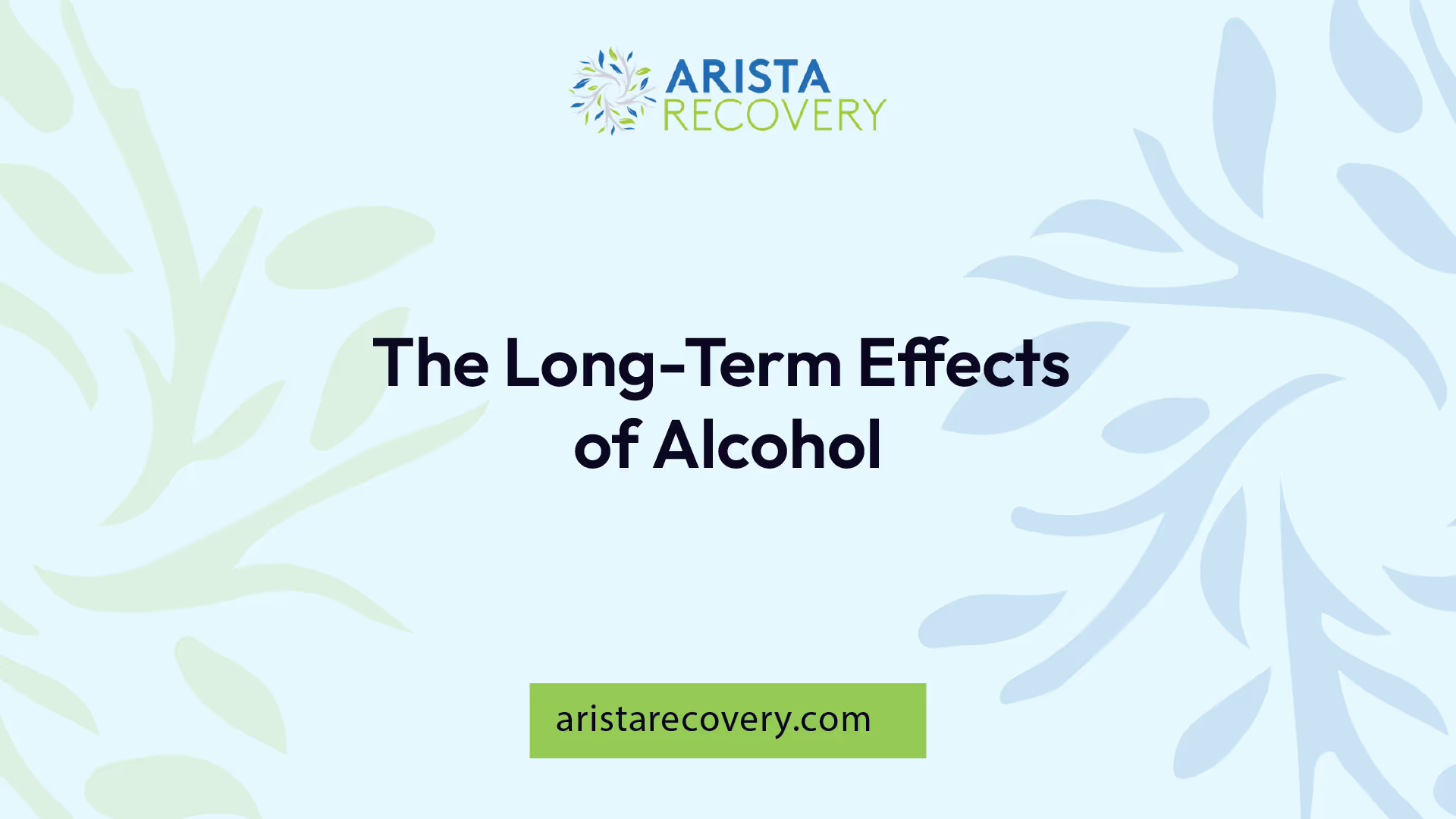The Long-Term Effects of Alcohol

Effects of Long-Term Alcohol Use
Long-term alcohol consumption can have profound and lasting impacts on a person's mental health and cognitive function. Understanding these effects is essential for recognizing the risks associated with excessive drinking.

Impact on Mental Health
Excessive drinking over time can lead to significant mental health problems, including conditions such as depression and anxiety. The relationship between alcohol consumption and mental health is complex; individuals suffering from severe mental illness may turn to alcohol as a method of self-medication to alleviate difficult emotions or symptoms. Research indicates that individuals who consume alcohol are more susceptible to developing mental health issues [1].
The prevalence of Alcohol Use Disorder (AUD) among those with mental health issues is notable. For instance, approximately 11% of individuals in treatment for schizophrenia have current AUD, with a lifetime prevalence around 21% [2].
Mental Health ConditionRisk IncreaseDepressionIncreased risk with excessive alcohol useAnxietyIncreased risk with excessive alcohol useCurrent AUD in Schizophrenia~11%Lifetime AUD in Schizophrenia~21%
Cognitive Impairment and Brain Damage
Long-term alcohol use can result in progressive alterations in brain structure and function. This leads to negative cognitive outcomes, including difficulties with memory, learning, and decision-making. Heavy drinking can cause changes in neuron size and functionality, which may contribute to severe, potentially permanent brain damage.
One specific disorder resulting from alcohol abuse is Wernicke-Korsakoff syndrome (WKS), characterized by memory loss, confusion, and vision problems due to a thiamine deficiency. This syndrome highlights the severe cognitive impairments linked to alcohol misuse [4].
Research demonstrates that some of the brain changes induced by AUD can improve with abstinence from alcohol over time, indicating that recovery is possible with the right support and treatment.
Brain Function ImpactConsequenceNeuron Size ReductionImpaired cognitive functionWernicke-Korsakoff SyndromeMemory issues, confusion, eyesight problemsPotential for RecoveryPossible improvements with abstinence
Acknowledging the long-term effects of alcohol on mental health and cognitive functioning is crucial in raising awareness about the risks of excessive drinking and the importance of seeking help when needed.
Alcohol-Related Disorders
Alcohol-related disorders encompass a range of conditions linked to the excessive consumption of alcohol. Two significant disorders in this category are alcohol-induced blackouts and alcohol use disorder (AUD).
Alcohol-Induced Blackouts
Alcohol-induced blackouts occur when a person consumes a significant amount of alcohol, resulting in temporary amnesia. This condition affects the transfer of memories from short-term to long-term storage, a process controlled by the hippocampus in the brain. During a blackout, individuals may be unable to recall events that transpired while they were under the influence of alcohol.
Severity of Alcohol UseLikelihood of BlackoutsLight DrinkingRarely OccursModerate DrinkingPossibleHeavy Drinking (Binge)Common
Binge drinking increases the risk of blackouts due to elevated blood alcohol concentration levels. The inability to remember events may have serious implications, including risky behaviors and dangerous situations.
Alcohol Use Disorder (AUD)
Alcohol use disorder (AUD) is a medical condition characterized by an inability to control or stop drinking despite negative consequences. This disorder affects millions of individuals and can lead to various physical and mental health issues. Among people in treatment for schizophrenia, the current prevalence of AUD is approximately 11%, with a lifetime prevalence of about 21%.
Data indicates that alcohol use disorder commonly co-occurs with other substance use disorders. More than 40% of men and 47% of women with AUD have had another substance use disorder in their lifetime [5].
DemographicsPrevalence of AUDMen40% (with another substance use disorder)Women47% (with another substance use disorder)
The long-term effects of alcohol can have a profound impact on various aspects of an individual's life, including their health, relationships, and social well-being. Understanding these disorders is vital for addressing the challenges associated with alcohol misuse.
Physical Health Consequences
Long-term alcohol use can have severe consequences on physical health, significantly impacting vital organs such as the liver and the heart. Understanding these effects is crucial in addressing the long-term effects of alcohol consumption.
Liver Damage and Disease
One of the most critical organs affected by prolonged alcohol misuse is the liver. Long-term alcohol use can reduce the liver's ability to regenerate, leading to serious and permanent damage. Alcohol-related liver disease (ARLD) has become increasingly common due to rising levels of alcohol misuse [6].
The following table highlights the stages of liver damage associated with chronic alcohol consumption:
Stage of Liver DamageDescriptionReversibilityAlcoholic Fatty LiverAccumulation of fat in the liver cells, often with no obvious symptoms.Can be reversed with abstinence.Alcoholic HepatitisInflammation of the liver caused by alcohol, with symptoms including liver pain and jaundice.May improve with abstinence.CirrhosisSignificant scarring of the liver; generally irreversible. Stopping alcohol can prevent further damage.Generally irreversible; can prevent future damage.
Cirrhosis stages pose significant health risks. Stopping alcohol consumption immediately can prevent further damage and significantly increase life expectancy [6].
Cardiovascular Effects
Chronic alcohol consumption can also lead to various cardiovascular issues. Heavy drinking can initiate arrhythmia, which disrupts the heart's normal rhythm and increases the risk of future episodes. The following table summarizes the cardiovascular implications of long-term alcohol use:
Cardiovascular ConditionDescriptionRisk FactorsArrhythmiaIrregular heartbeat can result from heavy drinking.Binge drinking and prolonged alcohol use.CardiomyopathyDisease of the heart muscle, weakening the heart's ability to pump blood effectively.Long-term exposure to high levels of alcohol.StrokeIncreased risk due to high blood pressure and arrhythmias.Excessive alcohol consumption and hypertension.
When alcohol intake is reduced or stopped, rapid improvement in blood pressure can occur within days, indicating potential health benefits for those with existing heart conditions.
New guidelines suggest that both men and women should limit their drinking to no more than 14 units per week to keep health risks low [7]. Addressing these physical health consequences is vital for promoting overall well-being.
Alcohol and Cancer Risk
The relationship between alcohol consumption and cancer is a critical topic in understanding the long-term effects of alcohol. Numerous studies highlight the implications of consistent alcohol use on cancer risk and development.
Types of Cancers Linked to Alcohol
A significant body of research demonstrates a clear correlation between alcohol use and various types of cancer. Alcohol is recognized as a risk factor for approximately 6% of all cancers and 4% of all cancer deaths in the United States [8]. The most strongly linked cancers include:
Cancer TypeAssociation with Alcohol UseMouthIncreased risk with any alcohol consumptionThroat (Pharynx)Elevated risk, particularly for heavy drinkersVoice Box (Larynx)Positive correlation with alcohol intakeEsophagusHeightened risk associated with alcohol useLiverStrongly linked to alcohol-related liver diseaseColorectalIncreased risk with regular consumptionBreastEven small amounts can raise risk significantly
In addition to these, alcohol consumption is also associated with melanoma, prostate, and pancreatic cancers. Conversely, some studies suggest a potential decrease in the risk of kidney cancers and non-Hodgkin lymphoma with alcohol consumption.
Impact on Cancer Development
The effect of alcohol on cancer development extends beyond direct causal relationships. Alcoholic beverages can contain carcinogenic contaminants introduced during fermentation and production. Compounds such as nitrosamines, asbestos fibers, phenols, and hydrocarbons may contribute to elevated cancer risks associated with alcohol [9].
Furthermore, individuals with certain types of cancer, specifically those affecting the upper aerodigestive tract, show an increased risk of developing second primary cancers correlating with their alcohol consumption levels prior to their initial cancer diagnosis.
This data indicates that even small amounts of alcohol can escalate risks, especially for sensitive demographics such as women regarding breast cancer [8].
Recognizing the strong scientific consensus on the risks associated with alcohol consumption is key to understanding its potential long-term effects on health, particularly concerning cancer.
Social and Emotional Implications
Long-term alcohol use can profoundly affect social relationships and emotional well-being. This section explores the connection between alcohol consumption and mental health issues, highlighting how relationships and emotional states can be impacted.
Relationship to Mental Illness
The relationship between alcohol and mental health disorders is complex. Regular heavy drinking is associated with symptoms of depression. Many individuals who experience depression find that their symptoms improve within weeks of stopping drinking, indicating a clear link between alcohol consumption and depressive symptoms.
Additionally, for those who struggle with anxiety, alcohol may initially provide a temporary sense of relaxation. However, relying on alcohol as a coping mechanism can lead to dependence over time, often exacerbating anxiety symptoms and creating a cycle of reliance. This reliance can intensify feelings of shame and isolation, contributing to further mental health issues.
The following table illustrates how alcohol misuse correlates with various mental health disorders:
Mental Health DisorderRelationship with AlcoholDepressionSymptoms can worsen with heavy drinking; improving upon cessation of alcohol.AnxietyInitial relief may lead to dependence, worsening overall anxiety.Suicidal TendenciesHeavy drinking increases risk due to lowered inhibitions and impulsivity.
Effects on Emotional Well-Being
Long-term alcohol consumption can also have detrimental effects on emotional well-being. As alcohol affects mood-regulating neurotransmitters in the brain, individuals may experience heightened emotional instability. The cyclical nature of alcohol dependency often results in increased emotional distress.
Moreover, heavy drinking can lead to a greater risk of suicidal thoughts and attempts due to its influence on inhibitions and impulsivity. Alcohol is notably linked to self-harm behaviors, making it crucial to address both alcohol use and underlying mental health conditions simultaneously.
Individuals who engage in excessive drinking may find their relationships suffer as well. Alcohol can create conflicts, cause misunderstandings, and erode trust within families and friendships, leading to further emotional hardships.
In summary, the long-term effects of alcohol significantly intersect with mental health and emotional well-being, underscoring the importance of recognizing these consequences.
Alcohol Guidelines and Prevention
Health Recommendations
To mitigate the long-term effects of alcohol, it is essential to adhere to established health guidelines. Recent guidance from the UK Chief Medical Officers recommends that both men and women should not regularly consume more than 14 units of alcohol per week to minimize health risks. Exceeding this amount can lead to serious health conditions such as cardiomyopathy and arrhythmias, ultimately increasing the risk of stroke [7].
Here is a summary of standard alcohol guidelines:
Population GroupRecommended Maximum Units Per WeekMen14Women14
Low-to-moderate consumption, defined as less than 15 to 20 grams per day (about 1 to 2 standard drinks), is associated with a reduced risk of cardiovascular disease. However, higher alcohol consumption and binge drinking significantly increase this risk, leading to conditions such as hypertension and coronary heart disease.
Strategies for Moderating Consumption
Implementing strategies for controlling alcohol intake is crucial for preventing potential health issues. Here are several effective approaches:
Following these strategies can promote a healthier lifestyle and reduce the long-term effects of alcohol consumption. Regular heavy drinking has been linked to symptoms of depression, and those experiencing mental health issues often report feeling better within weeks of ceasing alcohol intake.
References
[2]:
[3]:
[4]:
[5]:
[6]:
[7]:
[8]:
[9]:
[10]:


